This page has moved. If your browser doesn't automatically redirect to its new location, click here.
A Palestine Diary
Ramallah
I did not expect this. I expected poverty, and it is here,
especially in the villages. I expected concrete wreckage where Israel
had smashed buildings, for the wall -- for settlements, or simply
punitively. That is also here.
What I did not expect was a class of highly
educated professionals, university professors, doctors, business men,
clinicians, city planners, engineers (most of whom have studied outside
of Palestine). I did not expect complete strangers in the streets
and shops or Ramallah to engage me and when I said I was from New York,
to grin and announce that they had once lived/driven a bus/owned a shop
there. I did not expect highly intelligent women (some in hijab and
some not) to dispassionately discuss world affairs
I did not expect Ramallah. It is traditional Arab city with streets
that wind around dozens of hills, with the feel of San Francisco. All
of its buildings are made from white limestone, so on a sunny day, the
city is blindingly bright on its rocky hills. The traffic
is sparse and there are green gray olive
trees scattered everywhere along terraces or wherever there
is a spot of soil. There is also the wreckage of the governmental
compount where Arafat used to be imprisoned, lest anyone forget that
Israeli could at any time precision strike any building it chose.
But to get to this radient city, you have to cross Qalandya, an Israeli
checkpoint so large and long-standing that merchants have set up stalls
along both sides of it to sell household items and food while the
people wait. Getting INTO the West Bank is not so difficult, especially
if you have a foreign passport. But no one gets out without lots of
hassle and humiliation. The dozen or so soldiers on duty on any given
day have complete freedom in choosing whether to let people pass or
not. They are also free to shoot them. There are no consequences.
I lined up with the Arabs (mostly women and children)and found the
heavily armed Israelis were bored and sullen that day. In any case,
they
were less ominous than the chunkachunkachunka
of the bulldozers ripping their way along the Palestinian land behind
them. Qalandya was about to become part of The Wall. It already
loomed up on one side and ended right at the check
point. On the other side, the caterpillars and bulldozers inched along
gouging out the land, eating up
Palestine meter by meter.
And this is the Great Lie, that the wall and the check points and the
blockades are for "security". They are not. They do not block Israel
from Palestine. They criss-cross villages and surround cities WITHIN
Palestine and block village from village, schools from homes, clinics
from patients, workers from employment, families from shops. They
paralyze motion, bring commerce to a halt as shops close for lack of
business. They choke off
the life of an entire culture, bankrupting it literally and
figuratively, of its sense of itself. The blockades, at all levels are
collective punishment and the widespread suppression of a people who
had held the land for over a thousand years.
But for the tiniest number of souls which 'break' and attempt
vengeance, the Palestinian people everywhere try to adapt, to hold onto
family, social life, rationality.
I walk through this city, the only foreigner as far as I can see. My
pale skin and tweed jacket mark me as a westerner, but it is surprising
how many people know English, and speak it eloquently.
I write this in an internet cafe in downtown Ramallah, and you could
almost
forget that the Israelis have locked us in and surrounded us with their
military. The city
struggles to live, to be itself, while every day it becomes smaller.
The clock is ticking,
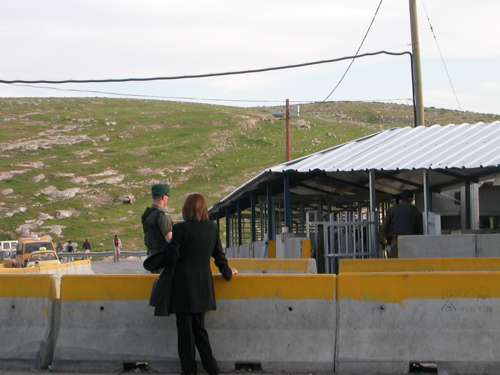
Waiting for the
Israeli Guard to take notice
Machsoom
I have learned what “machsoom” is.
For the machsoom is everywhere. You cannot go from any city to any
other city, any valley to any valley within the West Bank, without
confronting it. On your best days it means only delay and humiliation.
On your bad days, it means random arrest. Imprisonment without charge.
It is called “administrative detention” and that, like Guantanamo, is
open ended.
Between Nablus and Jerusalem, the public van I was traveling in (the
only foreigner among the Palestinians – mostly people on the way to
work) was stopped seven times. SEVEN. If you are Palestinian, you must
have a green permit. Or a blue one. Or an orange one. The date and
stamp must be correct. You must not quarrel with the soldier who stops
you, and has an AK 47 over his shoulder.
Palestinian men who are lucky enough to have jobs try to allow enough
time for these repeated blockages, but sometimes (they told me) they
finally arrive at work at the end of the shift and must come home again
without working. For the control stoppages last as long as the soldiers
want them to last. Humiliation cannot be rushed.
On the first leg out from Nablus, an old man, the only one in a
kheffia, was pulled off and sent to walk back the mile we had already
come. His permit was not correct. I do not know how he got back to
Nablus, for I saw no traffic going in that direction. Several stops
later, far out into the
hills on isolated stretches of road, another man was pulled off. Never
mind that his pass had already been examined by earlier checkpoints.
This time is didn’t pass muster and he was arrested and loaded into a
police van. No one in our van spoke, all eyes were averted, for fear of
having to join him.
Several more times along the road, we met them; Israeli military jeeps
suddenly appearing and blocking the road, demanding our papers. It
seemed random, but I don’t know. Someone must be giving orders some
place.
The last checkpoint was the worst. Two women soldiers stopped us.
Regular little Ilse Kochs. My American passport always seemed
to exempt me from abuse, but nothing exempted the others. One of the
soldiers who could not have been more than 20 – Israel’s Lindy England
I suppose, spat out commands in Hebrew to the passengers as she boarded
the van and collected everyone’s passes. Every single
pass had already been scrutinized many times before that morning, but
the passengers had to endure
it all over again. One women muttered something, I don’t know what,
and the solder ordered her off the bus. Then she chose about six men
and three women (two with babies) and made them get off the bus too.
She held everyone for 20 minutes lined up on the side of the road while
she leafed through their identity papers like playing cards. Then
one by one she let them back on the bus.
No one commented; everyone was quiet as the van took off again. But one
of the men said to me’ “Like this…every day. Every day.”
This is the “machsoom”, the gun in the face, the leash around the neck,
the slow suffocation of the West Bank.
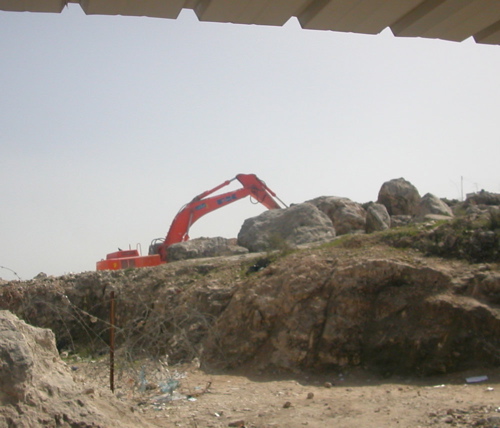 Israeli
bulldozers devouring Palestine
Israeli
bulldozers devouring Palestine
Village Medicine
Palestine, city and village, might have moved scientifically into
the twenty first century along with all the other Arab countries had it
not been for the fact that the conflict with Israel has cut it off from
the outside world. As a result, rural parts of the country have been
forced backwards to a pre-industrial standard of life. To circumvent
the blockades by going overland, many people have given up using
cars and reverted to travel by foot or donkey.
The most recent of the Israeli blockades is the Wall which increasingly
chokes off Palestinian towns and cities from the ‘air’ of the outside
world. Its most vicious effect is the cutting off of medical
access. Villages which once could send their most serious cases
to hospitals in Ramallah or even Jerusalem, now are blocked, and
ambulances which have not applied for permits in advance (a
contradiction in terms since emergencies cannot be ‘applied for’)
cannot pass through the check points into hospitals.
A temporary, and wholly insufficient solution to this is the mobile
medical unit and I was priviliged to travel one day with such a unit.
The attending physicians were Dr. Najah Barghouti (relative of the
recent presidential candidate and, unlike the other women on the team
who were in hijab, was short haired and fashionably dressed) and Dr.
Omar Ifiala.
I went with Dr. Barghouti and watched as she set up a temporary clinic
at Beit Seira. It was a bare bones affair, to say the least and, as if
to underscore how primitive it was, the van itself was delayed coming
into the village square by a flock of goats herded by a woman and two
small children. We unloaded finally at a mosque, setting up the clinic
in three of its back rooms. Two assistants, Zahia and Gemana, both
wearing the more conservative Islamic covering, made up a "pharmacy" on
a single small table.
The team set out a row of plastic chairs in the first room as a waiting
room and boxes of medicine were unloaded in the "pharmacy". In the
third room the staff laid out a thin mattress over a school room desk
as an examination table. Before opening up for the day, there was
a quick breakfast of pita, cheese and tomatoes and avocado.
Sparse as it was, the staff invited me to eat with them. By the time we
finished, there was already a crowd of patients in the waiting
room. Dr. Barghouti positioned herself at a tiny school desk with
a stethoscope and notepad and the clinic began.
The first patients were two elderly women in the traditional
Palestinian robes. Their heads were covered with long white scarves
that hung all the way down their backs like bridal veils. They were
largely toothless, and one of them could walk only with the assistance
of her friend. They did not disrobe for the examination, nor did any
other patients, nor did they have any preliminary testing. The
consultation consisted merely of the telling of symptoms, the doctor
listening with stethoscope slipped under the robe at the front and
back, and the writing out of a prescription (which was filled in the
next room). About half of the patients were small children or
babies, brought in by
their anxious mothers. The other patients were elderly, including one
blind man, the only patient to be given a blood pressure test. None of
the patients seemed in acute distress, but obesity seemed common, the
kind of obesity that occurs among the poor on a high starch low protein
diet.
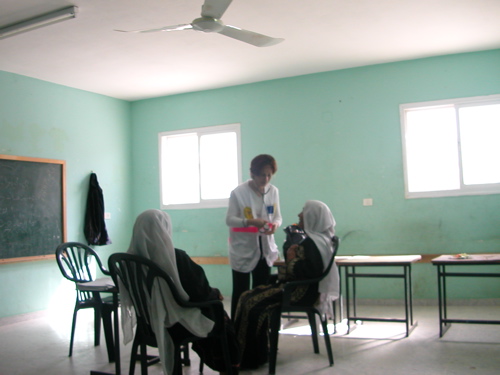 Practicing
medicine in the back room of a Mosque
Practicing
medicine in the back room of a Mosque
There was no great drama at this clinic, just the sad effort to
provide the absolute minimum care and when the waiting room was empty
the team closed the clinic and loaded the van for the long trip back to
Ramallah. It might have seemed that we had done some little bit of
good, but then I thought of my own asthmatic childhood and wondered how
I would have fared having such superficial medical attention. It seemed
obvious that there were still many people, especially children, who
succumbed to appendicitis, meningitis, accident, or simple
infection because the medical van did not arrive on the correct day.
And in fact, later that week I met a man who said his neighbor lost a
son that way, when a snake bit him. No doctor was available in town and
a dash by car to a check point was thwarted because the soldiers would
not let them pass through. The child died.
Still, under all conditions, people seek normalcy. As the van bumped
along, avoiding checkpoints by taking alternative routes over hills and
through olive orchards, we admired the new green. The weather had been
warm and there were wildflowers. The van stopped and we got out for a
moment. Zahia made a bouquet and taught me the Arabic word for
“wonderful”.
Dying of Thirst in Qalqilya
Qalqilya, a town on the western edge of the West Bank, sits over
one of the richest aquifers in the country and that is its misfortune.
For in a desert country, water is more precious than oil, and when that
country has been conquered by people with a taste for gardens and
agro-industry and swimming pools, seizure is inevitable.
Israel has thus far seized 13 of its wells, simply by virtue of the
fact that the well heads are now on the Israeli side of the Wall, on
land that is still Palestine (i.e. inside the green line, for the Wall
meanders freely) but such niceties seem to concern no one. The
remaining Palestinian wells are antiquated, but any development or
enlargement of these cannot be undertaken without special permits
which...you guessed it....are generally denied.
No matter. An Israeli company Macarot Co. is pleased to pump the water
out and sell it back to the Palestinians at reportedly twice to three
times the price paid by Jewish settlers. Interestingly, Palestinians
are required to meter their water; settlers are not. Our
guide and 'local informer' was Suhad, whose interest in the matter was
highly
personal. Her father's well had been confiscated by
Israel.
I have not yet mentioned that Qalqilya bears the distinction of being
the first Palestinian city to be completely walled in, choked off,
excised as it were, from the West Bank in general. And during the year
when Israel was building its Wall, (most of 2002) it paralyzed the
entire city with a complete military lockdown. Harvest could not be
delivered, workers could not travel to their jobs outside the city,
even if they were in other parts of Palestine, nothing moved without
Israeli permission. Qalqilya was a prison, with civil life
largely terminated, houses regularly searched, and Israeli tanks moving
through its streets. With blockages on every large road, the residents
were reduced to donkeys, or foot travel. Finally, in Dec. 2003, with
the completion of the main part of the Wall, the blockages were
loosened, although at that point, the issue was moot, since there was
and is now only one tiny entrance into the city, and that is carefully
guarded by military.
Suhad's voice was high and strained by fury as she told us this, and
then, to prove to us her story was not exaggerated, she took us to the
Wall. It ran behind an elementary school, guaranteeing
that a generation of school children will see themselves as prisoners,
and rose up high over the roof of the school building. The
wall had cameras at the top, but no armed soldiers, so we ventured
close. The area stank of feces and Suhad said the Wall blocked drainage
of the sewage system and in a recent rain, it had all risen to the
surface and covered the ground around the school.
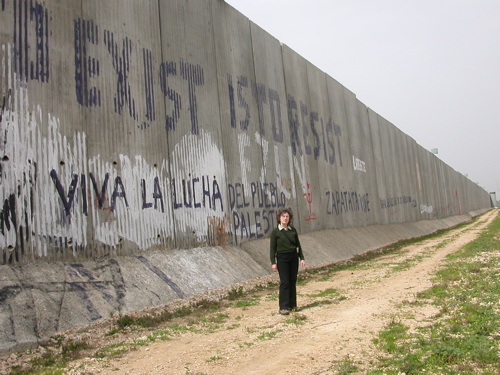 The Wall around
the West Bank
The Wall around
the West Bank
The Wall was covered with graffiti, most of it from foreigners.
Spanish, French, English curses, simple remarks like "This is Israel's
shame," and "Israel's new wailing wall." There was nothing we
could say to Suhad and she knew it, but there was more she wanted us to
see.
She took us to the area around a guard tower. It had been cleared for
hundreds of yards on both sides, and had multiple layers of fencing:
barbed wire, ditches, steel fencing, more ditches and more barbed wire.
"All that land over there was all a single farm," she said, "and it
belonged to him." Off to the side, an old man stood watching us, his
hand resting on one of the strands of barbed wire. I approached him and
greeted him in my primitive Arabic, but then Suhad joined us and
interpreted for him as he spoke. His eyes teared up as he said the land
once grew vegetables, enough to support his extended family of
fourteen. Now it was all gone, all but a single patch under his feet
which he still cultivated. The Israelis had offered symbolic
compensation, he said contemptuously, a few shekels for land his family
had held for countless generations. He pulled out a rumpled letter and
showed us the document, and Suhad translated it for us. In fact, it did
not even offer compensation, but merely said he could apply with the
local Israeli military office. He had not bothered to do so. He was
crying by then, and so were some of us, but all we could do was tell
him that we would tell his story.
This is his story. Please tell it.
Jerusalem, Jerusalem!
It is hard not to be swept off you feet by the experience of the
Old City at Jerusalem. Standing before the magnificent Damascus Gate
which opens to the souq of the Arab quarter, you can easily forget that
Jerusalem is at the center of a political storm, the question of
whether it is to be a city of the three great faiths, or the exclusive
possession of Jewish Israel. It seems in fact almost certain that
Israel will annex East Jerusalem and thus claim the entire city as its
capital.
Political outrage was the last thing on my mind however, when I
descended the wide stone steps of the Damascus Gate into the timeless
Arab souq.
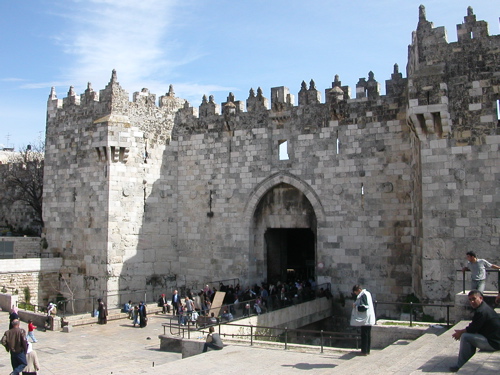
The Damascus
Gate leading to the Arab Quarter
Wonderful noise, the calling out of wares and prices, the sounds of
children singing something Koranic,(for there is a stall selling CDs
right at the entrance) the Arab-pop songs of the Lebanese Fairuz.
The physical city is not ancient; it was rebuilt for the last time in
the middle ages, but it might as well be, for as souqs go,
it is biblical. The ground is blocks of stone, designed for the flow of
both pedestrian traffic and the wheels of the carts. The front court is
mostly vegetables, farther along the tiny shops pressed up against each
other offer everything possible. It was amazing to think that the city
had been invaded and destroyed over and over again, but still always
returned to itself.
In a nutshell, Jerusalem was built by Canaanites, then conquered by
Egyptians, then Jews, then Babylonians, then Macedonians (Alexander the
Great) then Romans. When Constantine converted to Christianity,
Jerusalem became a Christian city, then (c. 614 AD) Muslim until the
Crusades. It was Christian until Salah al Din conquered it again and
made it Muslim which it stayed until after WW II when the British and
the UN partitioned it into Jewish and Arab sectors. And of course it is
still being contested today.
Our hotel was buried deep in the old city, in the Arab quarter, its
narrow entrance almost invisible between two densely packed market
stalls. Inside however, it had the perfect “caravanserai” form of the
three story quadrangle with archways opening to a center court.
Traditional Arab domestic architecture; discreet on the outside,
opulent on the inside. I needed to make a call on my cell phone, and to
get a good signal, I had to climb to the top story. And lo, right
before my eyes was the Dome of the Rock. That would be all
I would see of it though, since when I walked over to it later, I was
told it is open only to Moslems. (One of the women on our team—a
Pakistani -- is Muslim, and the guards made her recite the Koran before
they let her pass. She was in tears when she returned, since theey had
laughed at her the whole time.)
Apostate that I am, I did visit the Church of the Sepulchre – although
common sense and even a slight knowledge of history immediately negates
the church’s claim of being built over the tomb of Christ. Not to
mention the impossibility of identifying an EMPTY tomb 300 years later
as being the one that held the body for umm, two and a half days.
Unless it like....glowed...or something. But for all that, the droplet
of Christian sentimentality that still lives in me drove me to the
Christian quarter to see it.
It is quite a large church, appropriately spooky, with endless bays and
chapels, and is held jointly by Eastern Orthodox, Roman Catholics,
Armenians, Copts and Syrian Orthodox. The sepulcre itself is
tiny, no wider than the length of a coffin, marble walled and lit by
dozens of hanging lanterns. There were no tourists there when I
entered, so I got to stand alone for some time in it, waiting for some
sort of awe to hit me. Instead, as I crouched under the low lintel to
leave, the church itself hit me so to speak when I bumped my head
standing up again. (A little smiting of the infidel, ya
think?)
Well, whatever Jerusalem thought of me, I thought very highly of it,
and wish now I had both had more time and taken more photographs.
Copyright
2005 Justine Saracen





